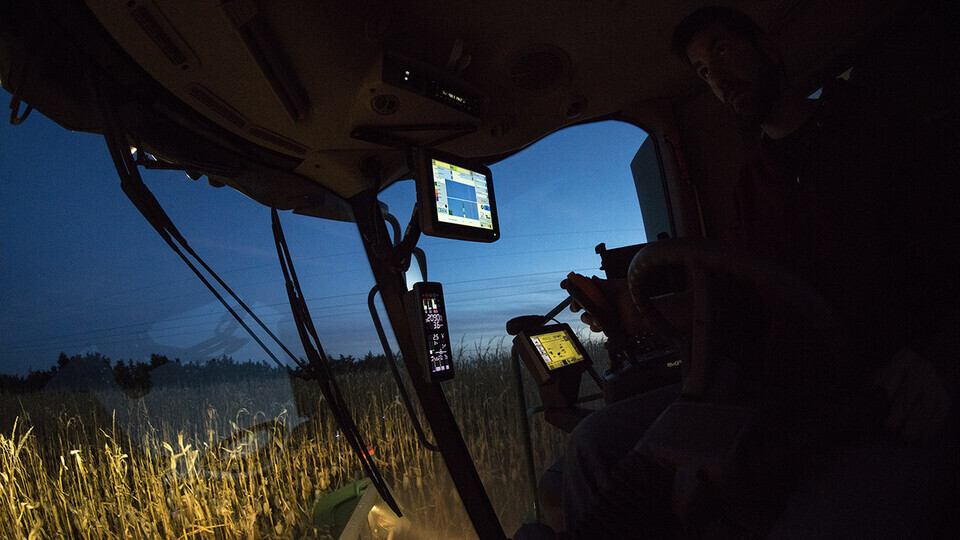
Lincoln, Neb. —Modern technology can inundate present-day ag producers with data from their farms and ranches. Tractors, combines and sprayers, facilitated by satellites, sensors and drones in combination with crop and livestock information, together generate a regular flood of field information.
Those precision-ag data sets are vast, but they exist separately on a wide range of software platforms. That disconnect is a major hindrance, preventing producers from sorting and using the data for maximum efficiency, profitability and environmental sustainability.
A new, federally funded initiative is working to end that disconnect by creating a network of national ag data repositories, the National Agricultural Producers Data Cooperative. A group of University of Nebraska–Lincoln faculty members is in the forefront of leading the effort, which involves a wide range of universities and stakeholder organizations.
The project aims to establish “a national framework for data that will be supported primarily by our land-grant institutions in partnership with producers and ranchers,” said Jennifer L. Clarke, professor of statistics and food science and technology at Nebraska and director of the university’s Quantitative Life Sciences Initiative. The planned national data framework is intended to be accessible, secure and supported through compatible software platforms across the ag-tech industry.
Above all, Clarke said, the project is geared to support producers’ real-world needs and enable “data-driven decision-making in agriculture.”
Clarke has a lead role in the project, for which the U.S. Department of Agriculture’s National Institute of Food and Agriculture recently issued a $960,000 grant, marking the initiative’s second round of NIFA funding.
In addition to Clarke, Husker faculty members with key duties are Joe Luck, precision agriculture and biological systems engineering; Laura Thompson, ag extension and farm research; Liz Lorang, data management and information systems; Matt Spangler, beef genetics; Scout Calvert, University Libraries; Hongfeng Yu, advanced cyberinfrastructure and high-performance computing; and Trenton Franz, hydrology and water management. Critical partner organizations include the Ag Data Coalition, AgGateway, Open Ag Data Alliance, National Animal Germplasm Program, Center for Advanced Innovation in Agriculture at Virginia Tech, MarketMaker, Clemson University and the Bovine Genome Database.
The project’s first phase focused on building a collaborative community of participants, gathering information and identifying critical needs. This new and second phase, Clarke said, features increased NIFA funding to facilitate critical pilot studies to move the process forward in concrete ways.
One of those studies will feature a central role for the Nebraska cattle industry. Husker researchers will work with the state’s beef cattle populations — cow-calf, seedstock, feedlot, on-farm research — to develop ways to host data, store it and provide efficient access to producers. The work will be in partnership with two federal repositories, the USDA’s Animal Germplasm Resources Information Network and the Bovine Genome Database.
“Nebraska is leading this,” Clarke said. “Having such a framework can be important to Nebraska and to national agriculture. It’s also an important part of fighting climate change and making sure we’re climate-resilient.”
Communication and dialogue are integral parts of the data cooperative process. Producers and organizations are encouraged to learn about the initiative at its website and join the project’s listserv.
The University of Nebraska–Lincoln will host a data cooperative conference in May at Nebraska Innovation Campus, with a focus on public input.
“We are a land-grant institution,” Clarke said, “and one of our goals as faculty is to support Nebraska and solve challenges that Nebraska and its constituents are facing. So, we really need to have the voice of the constituents at the table. That’s what really makes our activities worthwhile and of value.”
A central aim for the project is developing technical solutions to connect the many differing, incompatible ag-data platforms. Researchers are looking at two main options. One is to develop software called application programming interface that enables translation among different systems. The other is building collaboration among tech firms so that, moving forward, the new software systems they develop are compatible with each other.
“We need the idea of interoperability to be in the design phase of systems so they can actually talk to each other,” Clarke said.
The initiative involves a large range of academic disciplines and stakeholder organizations attempting to tackle challenging large-scale issues. It’s a complex process that has shown project participants the need to strengthen their communication and coordination, Clarke said. The process has also shown the need to avoid a “one size fits all” mentality; agricultural needs are too varied across the United States.
“Agriculture is local,” Clarke said. “Every agricultural system will have slightly different needs and requirements. So, we have to work with our regional partners and talk to the people on the ground to find out what their needs are.”
The project can help address national agricultural needs, “but another part is how to tailor the framework for regional needs” — which underscores the project’s ongoing need for public input and effective collaboration. Learn more.







